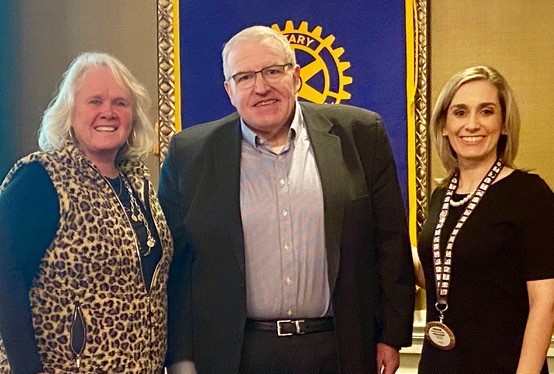Eyes were opened. Questions were asked. IRS tax business is going strong. W-2s and 1099s are circulating as are too many SSNs (Social Security numbers) and passwords. The bad guys of cyber and tech crimes are paying attention and are on the prowl … maybe inside your computer.
Brian F. Tankersley spent 45 minutes yesterday educating members of the Rotary Club of Farragut about cyber and identity theft focused on “Tips for Protecting Your Data in the New Year!”
Tankersley, a Farragut resident, is a top-rated speaker with thousands of educational presentations for accountants and other financial professionals across the U.S. and Canada. He has more than 30 years of professional experience in accounting, technology, and education. Tankersley has been recognized eight times as one of the “Top 25 Thought Leaders in Public Accounting Technology” by Cygnus Business Media. He is a Certified Public Accountant in Tennessee.
After about five minutes it was obvious this guy is the real deal, plugged into the world of cyber crimes and how shrewd and criminally effectively these people really are and how much we do not know about protecting ourselves.
He focused on three primary areas – Phishing and Ransomware, Passwords/Credential Stuffing and Voice Scam Frauds. It was high tech talk that he was able to make understandable to the non-tech experts in the room at Fox Den Country Club.
Just yesterday, his email was hit by four phishing attacks within a 30-hour period. They want your personal information – passwords, credit card and bank numbers and who you do business with and where.
Here were his main recommendations to fight these cyber-attack criminals:
- Passwords: “Make them long and strong, a minimum of 12 characters, letters, upper and lower cases, one number, one symbol or special character, and never use the same password for multiple websites, apps and email accounts. Same for usernames, computers and phones.”
- Find a good password management software app to use.
- Start changing older passwords.
- Do not open PDF files from anyone. If it’s a friend, ask if they sent it first. They can be packed with viruses and malware.
- Be cautious when opening pictures. Many contain malware.
- Watch for emails doing Quick Books impersonations.
- Beware the fake emails asking you about your payment information for McAfee and Norton virus protection.
- Be suspicious of all links in emails. You won’t be sorry.
“These bad guys have tricks that stay a step ahead of us. They can disable your anti-virus applications on your computer,” he said. “They can steal and delete your data and even install their apps on your computer. They go after big and small companies, cities and counties, and if the company somehow stops them and refuses to pay a ransom, they go after the employees individually.”
In 2020 the city of Knoxville paid approximately $217,000 to clean up after an attack. Pellissippi State Community College was hit in February 2022 and East Tennessee Children’s Hospital also suffered a hit. An undisclosed number of patients and parents had sensitive health information stolen and X-ray and email operations were disrupted.
As Tankersley said: “…We never know when and where the next attack will hit.”
Someone asked, “Where are the attacks originating?”
“China, Eastern Europe, Poland, Russia, Turkey, Nigeria, North Korea, Taiwan, India, Italy and Hungary. Everywhere I think,” he said.
If you have questions for Brian, you can message him @BFTCPA on Twitter and Instagram.
Tom King has been the editor of newspapers in Texas and California and also worked in Tennessee and Georgia and is a past president of the Rotary Club of Farragut. If you want more information about Rotary or are interested in attending a meeting or joining, please email Tom.

